- Home
- Laura Resnick
Vamparazzi
Vamparazzi Read online
Table of Contents
Title Page
Copyright Page
Dedication
Chapter 1
Chapter 2
Chapter 3
Chapter 4
Chapter 5
Chapter 6
Chapter 7
Chapter 8
Chapter 9
Chapter 10
Chapter 11
Chapter 12
Chapter 13
Chapter 14
Chapter 15
Chapter 16
Chapter 17
Chapter 18
Chapter 19
Chapter 20
Chapter 21
Chapter 22
Epilogue
Author’s Note
Also by Laura Resnick
Raves for the Esther Diamond series:
“This gleeful, clever sequel to 2006’s Disappearing Nightly teams up actress and singing waitress Esther Diamond with the magic-savvy but utterly unworldly Max the Magician and his slobbering canine familiar, Nelli, to discover how and why New York’s mobsters are being magically duplicated around her convincingly self-absorbed chorus-girl heroine. Sexy interludes raise the tension between Lopez and Esther as she juggles magical assailants, her perennially distracted agent, her meddling mother, and wiseguys both friendly and threatening in a well-crafted, rollicking mystery.”
—Publishers Weekly
“Fans of Charlaine Harris’s Sookie Stackhouse series will appreciate this series’ lively heroine and the appealing combination of humor, mystery, and romance.”
—Library Journal
“Seasoned by a good measure of humor, this fantasy mystery is a genuine treat for readers of any genre.”
—SF Chronicle
“With a wry, tongue-in-cheek style reminiscent of Janet Evanovich, this entertaining tale pokes fun at the deadly serious urban fantasy subgenre while drawing the reader into a fairly well-plotted mystery. The largerthan-life characters are apropos to the theatrical setting, and Esther’s charming, self-deprecating voice makes her an appealingly quirky heroine. The chemistry between Esther and Lopez sizzles, while scenes of slapstick comedy will have will have the reader laughing out loud and eager for further tales of Esther’s adventures.”
—Romantic Times
“Plenty of fun for readers.”
—Locus
“A delightful mélange of amateur sleuth mystery, romance, and urban fantasy.”
—The Barnes and Noble Review
“A paranormal screwball comedy adventure. Light, happy, fantastically funny!”
—Jennifer Crusie, New York Times bestselling author
Also by Laura Resnick
DISAPPEARING NIGHTLY
DOPPELGANGSTER
UNSYMPATHETIC MAGIC
VAMPARAZZI
POLTERHEIST*
*Coming soon from DAW Books
Copyright © 2011 by Laura Resnick.
All Rights Reserved.
DAW Book Collectors No. 1562.
DAW Books are distributed by Penguin Group (USA) Inc.
All characters and events in this book are fictitious. Any resemblance to persons living or dead is strictly coincidental.
The scanning, uploading and distribution of this book via the Internet or via any other means without the permission of the publisher is illegal, and punishable by law. Please purchase only authorized electronic editions, and do not participate in or encourage the electronic piracy of copyrighted materials. Your support of the author’s rights is appreciated.
ISBN : 978-1-101-54762-5
First Printing, October 20 11
DAW TRADEMARK REGISTERED
U.S. PAT. AND TM. OFF. AND FOREIGN COUNTRIES
—MARCA REGISTRADA
HECHO EN U.S.A.
http://us.penguingroup.com
This book is dedicated to Lucia Macro, my first real editor. (Technically, I had two editors before her, but they both left the profession soon after I was assigned to them. Draw your own conclusions.) Over the course of several years and multiple books, Lucia taught me a great deal about improving my craft. If you enjoy this novel, it’s partly thanks to what I learned from her.
Prologue
Belgrade, 1733
It was late at night when the two men met at a modest inn that sat in a narrow street of the oft-conquered “white city” which lay along the Sava River where it flowed into the Danube. Here in the heart of the Habsburg Empire’s restless eastern provinces, which had been claimed as a war prize from the Ottoman Turks in recent years, the men met as allies—as friends, in truth. After concluding their secret business, they would part company for the last time, never to meet again.
And what they accomplished tonight in this obscure Serbian inn, by the flickering light of cheap tallow candles that smoked unpleasantly, would affect the fate of many individuals, human and otherwise, on more than one continent, for centuries to come—though only a few select people would ever know about it.
Jurgis Radvila had arrived in Belgrade the previous day and had been waiting inside the inn since then. So he was dry and relatively comfortable—though this private back room’s amenities did not extend to a hearth fire—when Dr. Maximillian Zadok arrived, dripping wet and shivering from the miserable weather of early spring.
As Max issued a breathless greeting to his colleague, a cocky servant boy helped him remove his wet cloak and hat. The innkeeper and his wife were already abed, but the boy, perhaps identifying this courteous foreigner as a gentleman likely to reward him with a few extra coins for good service, proposed bringing him some bread, cheese, and ale. Max accepted the suggestion, and he offered to pay handsomely to have his weary horse fed, rubbed down, and stabled for the rest of the night.
Radvila told the boy that he would not be using his own bed tonight, for which he had paid in advance; his colleague could have it. He added that his own horse would need to be saddled and ready to depart within the hour.
The boy looked puzzled, since traveling so late at night was decidedly eccentric—as well as dangerous. The men dismissed the lad. They felt no inclination to explain to a curious servant that they both had unusual means of defending themselves against the usual perils.
Nonetheless, Max warned, “Traveling conditions are abysmal tonight, my friend.”
“I have a very long journey ahead of me. The sooner I leave, the sooner I will be in Vilnius.” The Lithuanian shrugged, his heavily lined face revealing no dismay about enduring the wet, windy night. “And I am restless after two days in this inn. You know how inactivity vexes me.”
“I do apologize for my late arrival,” Max said. “I had thought to be here several days ago. But the boat I was on foundered. And the condition of the roads . . .” He shook his head.
“I was growing concerned. I am relieved to see you.”
“And I you,” Max replied. “I gather that the, er, work was completed successfully?”
“Of course,” said the gray-haired man.
“I had no doubts, but nonetheless, I am relieved. It was a daunting and dangerous endeavor. As I well know.”
“It was necessary,” Radvila said simply. After a brief pause, he said, “You have come alone, Maximillian?”
The two men spoke to each other in Latin, as was their established habit; although they were both fluent in multiple languages, it was their only common tongue. Of necessity, they had each learned to speak a little Serbian during their sojourn in this region, but their fluency in it stopped well short of intelligent conversation. Their syntax in the local language relied primarily on phrases such as, “Where is the vampire?” and “Open the grave.”
Max was about to respond to Radvila’s question when the door opened and the servant boy carried in a mode
stly loaded tray. He set it down, then told them he would go awaken the groom and deliver the instructions about their horses. The boy closed the door behind him as he departed.
As soon as they were alone again, Radvila asked, “Does your solitary arrival mean you have been unsuccessful in securing the necessary support for the treaty?”
“On the contrary. I am alone, as you observed, but not empty-handed.” After a brief, longing glance at the food and ale, Max picked up the leather satchel he had been protecting from the weather by shielding it under his traveling cloak. He opened it to reveal documents inside, kept safe and dry during his long, eventful journey from the imperial court in Vienna to this weary city in the Balkan Peninsula.
“What is this?” Radvila asked, watching as Max withdrew the documents from the satchel.
“This is the result of my negotiations with the Magnum Collegium and with the Austrian government. My efforts did not produce precisely the results that you and I discussed—”
“They won’t sign the treaty?” Radvila’s gray brows swooped down in sudden anger. “If my comrades and I had not intervened—”
“Calm yourself, my dear fellow,” Max said. “The treaty will be ratified tonight. The Magnum Collegium and the imperial court of Charles VI have each provided official letters authorizing me to sign it on their behalf. These are your copies of those documents.”
With a courtly gesture to honor the historicity of the occasion, Max presented the documents to Radvila, saying, “As the designated representative of the Magnum Collegium, which esteemed body recognizes the wisdom of your proposal to them, and as a temporarily appointed envoy of the Habsburg monarchy, which government expresses its gratitude for all that you and your comrades have done to help stabilize its newly acquired provinces in this volatile region—”
“We did not do it for the Habsburgs,” Radvila said brusquely.
“I hereby present you with these documents which guarantee that my signature on the Treaty of Gediminas will bind these parties to this sacred agreement, as surely as your signature will commit the Council of Gediminas to it.”
Radvila accepted the documents and looked them over. “I can’t decide whether their Latin is very weak or very good.”
“I don’t understand.”
“These letters are oddly phrased.”
“Are you saying they’re unacceptable?” Max asked with concern.
“Oh, I find them acceptable,” the Lithuanian said dryly. “But do you?”
“Oh. Yes. Well, er . . .” Max cleared his throat. “Although agreeing to this treaty was seen as prudent when I explained what I had experienced here in His Majesty’s eastern provinces . . .”
“Yes?”
“The treaty was also perceived as controversial and potentially a source of great embarrassment,” he concluded uncomfortably.
“Ah. I see. And thus if anything goes wrong . . .” Radvila waved one of the letters at his colleague. “You will be held responsible.”
“Yes. I will.” Max spoke with resolve as he added, “I accept that risk. I have seen too much to turn back now.”
Radvila extended his own hand to clasp Max’s with warm approval. “I knew the night we met that you were a man with the courage to see this through. Indeed, I have often been amazed to find such wisdom in one so young.”
“Oh . . . I’m a little older than I look,” his companion replied. “Now, since you must depart soon, I suggest we proceed.”
“Of course.” Radvila added with a touch of concern, “And then I urge you to eat and get some rest. If I may speak candidly, you look terrible.”
“I have no doubt of it,” Max said wearily.
Radvila laid out upon the wooden table three copies of the treaty he had brought with him. Max reviewed the elegant text, acknowledged that the terms were exactly as they had discussed, and accepted the quill that Radvila handed him.
A few moments later, all three copies were signed.
The two men stood silently, looking down at their signatures, and recognized the significance of what they had wrought.
Then the Lithuanian smiled and slapped his companion on the back. “Your vampire hunting days are over, Maximillian.”
“Indeed,” Max said. “I pray that I have done the right thing.”
1
Everything you think you know about vampires is wrong.
I learned this while being harassed by vampire fanatics, bitten eight times a week by a self-proclaimed creature of the night, and attacked by a real vampire. So I speak with some authority on the subject.
Much of my education about vampires came from my friend, Dr. Maximillian Zadok, a 350-year-old mage who protects New York City from Evil. You would think (I certainly did) that ridding the city of the bloodsucking undead would be included in that job description, but it turns out that confronting vampires is a little more complicated than a simple equation of Max versus Evil. Among those of the exsanguinating persuasion, there is a wide range of behavior, from “evil monster” all the way across the spectrum to “law-abiding and fully integrated member of society.”
Who knew?
Something else I learned is that vampires are exactly like vegetarians, in the sense that you can spend a lot of time with one and not have the faintest idea—until it’s mealtime.
I speak from experience about that, too.
My name is Esther Diamond, and I’m an actress. My reluctant familiarity with vampires of all varieties—real, fictional, and pretend—began when I was cast in The Vampyre, a new stage play based on the nineteenth-century story by Dr. John Polidori. The author is mostly remembered in our time because he accompanied Lord Byron on a trip through Europe in 1816, serving as the mercurial poet’s personal physician. Polidori was with Byron, Mary Shelley, and Percy Bysshe Shelley at the rented villa in Switzerland that summer where, in response to a challenge set by Byron that they should each write a ghost story, Mary started work on her famous novel Frankenstein.
Dr. Polidori was soon fired by Byron—who was reputedly the inspiration for Lord Ruthven, the title character in Polidori’s “Vampyre;” Ruthven is an alluringly sinister aristocrat who uses and abuses others without compassion or conscience. Published in 1819, the story was a commercial success in its era, igniting the reading public’s enduring love affair with vampires. It was the first vampire fiction written in English, and also the first characterization of a vampire as seductive and sophisticated. Although the work is little-known today, Polidori’s vision of the vampire was innovative in its time, and it influenced other fiction writers of his century—including Bram Stoker, who came along several generations later and wholly eclipsed Polidori’s tale with Dracula, which has dominated our image of vampires ever since.
Polidori died two years after the initial publication of his story, when he was only twenty-six years old—one year younger than I was when I was cast in the play.
I had never heard of “The Vampyre” (or Polidori) until I learned about this planned production. Since no copies of the brand-new stage adaptation were available, I read Polidori’s story when preparing for the audition. And I immediately realized why its popularity these days is limited to ardent students of nineteenth-century gothic literature. Although mercifully short, its flowery language and flimsy characterization don’t translate well to modern tastes.
The story’s protagonist is an apple-cheeked young Englishman named Aubrey who is befriended by the dissipated Lord Ruthven. They travel together to Europe, where Aubrey falls in love with the ravishingly beautiful and innocent Ianthe—who happens to be obsessed with vampire folklore. Aubrey doesn’t take her quaint fears seriously until after she’s found dead, with telltale teeth marks on her neck. By the time he realizes that Lord Ruthven is the quaint fear that killed Ianthe, Aubrey has already made a sacred promise, sworn under duress, not to reveal what he knows. So, naturally, he can do nothing thereafter but wring his hands in helpless despair. Aubrey returns to England, where he soon falls ill,
and he’s incoherent with fever by the time he discovers that his beloved sister’s new fiancé is none other than—yes!—Lord Ruthven. The young man dies without managing to warn his sister what a fine mess she’s getting herself into. The aristocratic vampire slakes his thirst on his new bride (can you spot the metaphor?), then he disappears, leaving behind her corpse. The end.
Only the lucrative popularity of vampires in contemporary culture, I thought, could explain the resurrection of this storyline for an off-Broadway play.
Indeed, as I soon learned, the popularity of one particular vampire explained it: Daemon Ravel.
Though the atmospheric play was (to be candid) mediocre fare, Ruthven was an ideal role for this Byronic leading man who played only vampires—and who, indeed, claimed to be a vampire. The Vampyre was being produced as a showcase for him. I had never heard of Daemon Ravel, but I kept my happy ignorance to myself during the initial audition. During the callback, when Daemon was brought in to read opposite me, I pretended to know who he was and to be an admirer of his work, since I shrewdly sensed that admitting otherwise might cost me the job.
Sure, I have principles. But I also have bills to pay. Most of all, I have an ardent desire to work in my profession.
Anyhow, I got the job. No, not the job as the ravishingly beautiful Ianthe; that role went to a ravishingly beautiful actress. I was cast as Aubrey’s sister. She has no name in Polidori’s story, where the two female characters are little more than a means for Lord Ruthven to torment Aubrey. For the play, though, the sister was named Jane—Miss Jane Aubrey. In the story, she’s a delicate ingenue, barely eighteen years old. In the play, to differentiate her from the young and innocent Ianthe, she became a twenty-four-year-old spinster, a doting older sister who had been managing Aubrey’s household since their parents’ deaths, and who was considered past praying for, in terms of marriage, until Lord Ruthven came along.

 The Purifying Fire p-2
The Purifying Fire p-2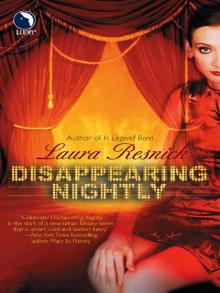 Disappearing Nightly
Disappearing Nightly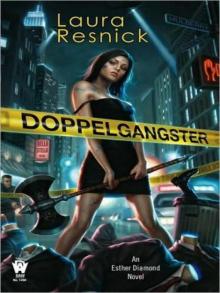 Doppelgangster
Doppelgangster In Legend Born
In Legend Born The Destroyer Goddess
The Destroyer Goddess The Purifying Fire: A Planeswalker Novel
The Purifying Fire: A Planeswalker Novel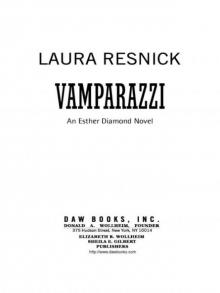 Vamparazzi
Vamparazzi A Wilder Name
A Wilder Name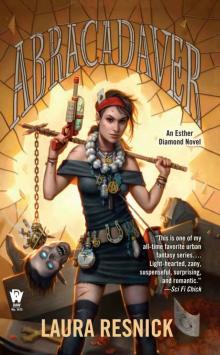 Abracadaver (Esther Diamond Novel)
Abracadaver (Esther Diamond Novel)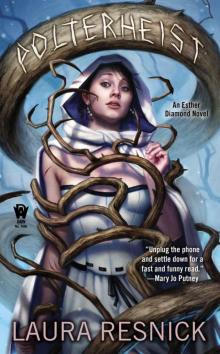 Polterheist: An Esther Diamond Novel
Polterheist: An Esther Diamond Novel The Misfortune Cookie ed-6
The Misfortune Cookie ed-6 Fever Dreams
Fever Dreams The White Dragon
The White Dragon Dopplegangster
Dopplegangster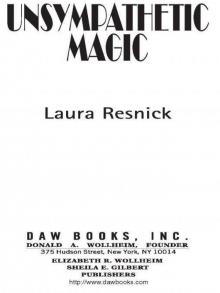 Unsympathetic Magic
Unsympathetic Magic